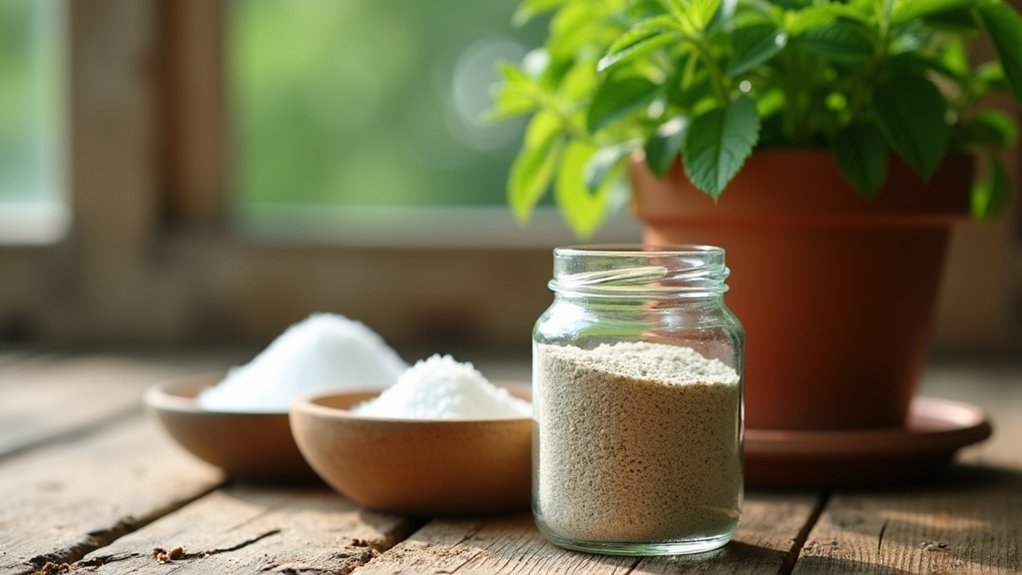For pet-safe ant control, try a vinegar-water spray (50/50 mixture) on ant trails and entry points to disrupt their scent paths. Food-grade diatomaceous earth creates a safe physical barrier that dehydrates ants but won’t harm pets. Essential oils like peppermint or lemon eucalyptus, diluted in water, also effectively repel ants while remaining pet-friendly. These natural methods protect your furry family members while keeping your home ant-free – discover how these solutions offer long-term protection below.
Why Traditional Ant Killers Pose Risks to Pets
While battling an ant invasion in your home seems straightforward, traditional ant-killing products can create dangerous situations for your four-legged companions.
Most conventional solutions contain toxic chemicals like pyrethroids and organophosphates that pets can absorb through their skin or ingest directly.
Common ant killers contain chemicals that can harm pets through absorption or ingestion.
Even commercial ant baits with relatively low toxicity levels present significant hazards. Your curious pets might be attracted to sweet bait ingredients, increasing the risk of accidental ingestion and subsequent poisoning symptoms.
Though some ant sprays become safer once dried, their diminishing effectiveness requires frequent reapplications, heightening your pet’s chemical exposure.
If you notice vomiting, tremors, or lethargy in your pet after potential contact with ant control products, seek immediate veterinary attention.
The potential dangers these traditional ant killers pose simply aren’t worth risking your pet’s health.
Natural Ant Deterrents Safe for Homes With Animals
Since your pets’ safety remains paramount when battling household pests, several natural alternatives offer effective ant control without the toxic risks of commercial products. You’ll find numerous pet-safe ant killers that use ingredients already in your pantry.
| Natural Remedy | Application Method | Safety Level |
|---|---|---|
| Diatomaceous earth | Sprinkle at entry points | High (food-grade only) |
| Vinegar and water mixture | Spray 50/50 solution | Very high |
| Ground black pepper/Cinnamon | Dust along baseboards | High |
Essential oils like peppermint and lemon eucalyptus work effectively when diluted in homemade ant spray. Simply mix with water and apply where you’ve spotted ant activity. For ongoing ant prevention, regularly clean surfaces with vinegar solutions to disrupt their scent trails. Unlike borax-based solutions, these natural remedies provide effective control without endangering your furry family members.
Preventive Measures to Keep Ants Away Without Chemicals
Because ants establish persistent colonies that can quickly infiltrate your home, implementing preventive measures offers the most effective long-term solution for pet owners.
To prevent ants, consistently clean your kitchen surfaces and floors to eliminate crumbs and food sources that attract insects. Seal any cracks around windows, doors, and foundations that serve as entry points into your living space.
Create a barrier using pet-safe substances like diatomaceous earth or chalk around areas you want to protect. Natural deterrents like vinegar or lemon juice can be used in a homemade ant spray to disrupt pheromone trails without endangering your pets.
Don’t forget your home’s exterior—secure garbage cans, remove food debris, and trim vegetation near your house to keep ants away and discourage them from establishing nests close to your home.
Frequently Asked Questions
How Do You Make a Pet Safe Ant Trap?
You can make a pet-safe ant trap by mixing equal parts borax and sugar, then placing it in areas inaccessible to pets. Alternatively, use cotton balls soaked in borax-sugar-water solution in pet-proof locations.
What Ant Spray Is Not Harmful to Pets?
Choose EcoSMART or Wondercide ant sprays containing plant-based ingredients like essential oils. You’ll want products specifically labeled “pet-safe.” Let sprayed areas dry completely before allowing your pets access, and always monitor for unusual reactions.
Does Vinegar Kill Ants Permanently?
No, vinegar doesn’t kill ants permanently. It can kill ants on contact and disrupt their trails temporarily, but you’ll need to reapply regularly as it doesn’t eliminate colonies or prevent future infestations.
Can You Get a Pet Friendly Ant Killer?
Yes, you can get pet-friendly ant killers. Options include diatomaceous earth, borax mixed with sugar (kept away from pets), vinegar, lemon juice, and commercial products like Advion Ant Gel and Terro Liquid Ant Bait.
In Summary
You’ve now got three pet-safe ways to tackle ant problems without endangering your furry friends. By using natural deterrents like diatomaceous earth, creating vinegar barriers, or setting up borax bait stations properly, you’ll keep your home ant-free safely. Remember, consistency is key—combine these methods with good prevention habits like prompt cleanup and sealing entry points for the best results. Your pets will thank you!





Leave a Reply